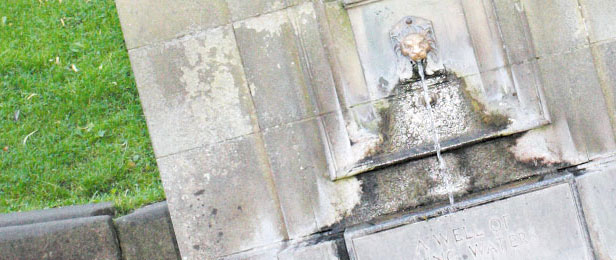

The Romans
A hotel more than 3,000 years in the making
So far, we have been relating only comparatively recent history, as historians believe that a building to give shelter and sustenance to travellers has possibly stood on this site for at least three thousand years or more. The warm spring which is beneath the hotel was considered to be an important sacred shrine in pre Roman times. It was at the intersection of three main Celtic routes, crossing what was then an extremely wild and hostile landscape… The Pennines. The luxury of a hot and abundant spring giving off thousands of gallons of warm and beneficial water must have been a godsend to the cold and weary Celtic travellers of the time. Hot running water was unheard of in those days, so what a place for the Celts to stay and take a hot bath!
The Romans were already very much into warm baths, especially when they arrived in cold Britannica which was the most northerly posting in the Roman Empire. They probably couldn’t believe their luck to discover what the Celts had discovered and made good use of before them; gallons and gallons of hot running water. They named the place after the Celtish goddess of the spring ‘Aqua Arnemetiae’ and built a Roman Baths, just as they did at Bath in Somerset, which they called ‘Aqua Sulis’. And just as they did at Bath in Somerset it is almost certain that they built hot and cold bath houses, a temple and most essential …a place to eat and sleep! ‘Aqua Arnematiae’ (Buxton) was an important Roman settlement. It was at the intersection of two main military roads, and a place for bathing in the warm and natural waters. Unfortunately all the remains of the Roman baths have gone. It is thought that successive developers in the 16th, 17th, 18th, and 19th, centuries have either built over, or destroyed them.
 A large Roman, (boat shaped), stone bath was uncovered in the eighteenth century next to the Old Hall, but was buried again. Layers of lead lining were also discovered. In 1975 a deposit of Roman coins including those bearing the mark of Emperor Constantine were found over the site of the spring, which would give credence to the site of the Roman bath, as it was the habit of Romans to throw coins and tokens into the spring with messages to the Gods. For hotel guests who are interested, the spring is immediately under the eastern end of the hotel.
A large Roman, (boat shaped), stone bath was uncovered in the eighteenth century next to the Old Hall, but was buried again. Layers of lead lining were also discovered. In 1975 a deposit of Roman coins including those bearing the mark of Emperor Constantine were found over the site of the spring, which would give credence to the site of the Roman bath, as it was the habit of Romans to throw coins and tokens into the spring with messages to the Gods. For hotel guests who are interested, the spring is immediately under the eastern end of the hotel.
So, The Old Hall Hotel in Buxton and the sacred place it sits upon, goes a long way back in time. Since the present building was built in 1573, on the site of the earlier Auld Hall, the hotel has continually served intrepid travellers from around the world.
Many famous people have slept away the nights in its ancient rooms. They say that each room could write a book, with perhaps a few plots of treason, intrigue and maybe the odd ghost story thrown in. If you’re staying here, just before you drop off to sleep tonight, let your mind wander a while, and think of all the wondrous things that have happened at this place for over three thousand years or more.
To make a booking, or for more information, please contact reception on 01298 22841




